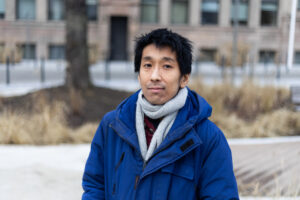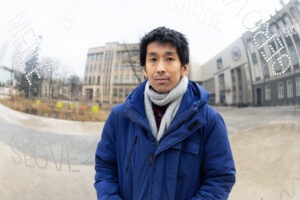He believes some of the work that is being done and created will only be relevant and meaningful many years from now.
Convinced that personal feelings cannot be expressed through music
The KTU PhD student, who has had various experiences in the world of music, says that his favourite activity in this field is performing pieces created by other professionals. In his opinion he is neither a creative nor a scientific person, that is why he prefers this form of self-expression.
“Performing music can be a complete break from both the verbal world, which is essentially what science is based on, and the emotional world that we encounter in our everyday lives,” adds Yusuke.
The musicologist also holds an opinion that, in his words, many in the music world would disagree with.
“In my experience, you can’t convey personal emotions through music because they are constantly changing,” he explains.
According to a professional from Japan, while listening to music we feel and accept something quite different from what the composer expects. Moreover, even the feelings that arise when listening to music for the first and second time are completely different.
Yusuke’s understanding of East Asian culture and his familiarity with European countries confirms that the regions have quite different approaches to the classical music genre.
“You could feel that classical music has become quite accepted by society in France or Germany, whereas in Japan, it is still a tool for the education system.
In your country, people pay more attention to the context of music than to the music itself. Performers also tend to tell more with their words than is embedded in the music,” the musicologist believes.
Yusuke reveals that when he decided to continue his studies in Lithuania, he was not aware that all the composers he was interested in had emigrated to the USA.
“Maybe I would have gone there instead of Lithuania,” he says with a smile.
However, Yusuke has no regrets about coming to live to Lithuania, saying that being a tourist is not enough to get to know a country, its people, its culture, and even more so, its music.
Unexpected Lithuanian attitudes toward foreigners speaking Lithuanian
When asked about studying and learning in different countries, Yusuke says that he cannot compare universities due to the different study programmes that he was in. Yet, he sees differences and similarities in all educational systems.
“It’s important to be yourself and to be brave enough to reject what doesn’t suit you in France and Germany, whereas in Lithuania or Japan, it’s important to adapt. It was interesting to me that in both Lithuania and Japan, everyone cared about the result, compared to France, where it didn’t matter at all,” recalls Ishii.
When it comes to other differences, a Japanese Yusuke who fluently speaks and writes Lithuanian is surprised by the attitude of Lithuanians towards foreigners who speak their language and the number of questions he is asked on this topic.
The French never question me speaking French, and it’s hard to imagine Americans asking questions about how I learned to speak English. I used to wonder why Lithuanians overestimate foreigners who speak their language. I agree that Lithuanian is difficult, but all languages are difficult.
After doing some research, Yusuke realised that Lithuanians have not only strong opinions about their language but also a mentality which encourages a need to adapt.
“I used to think that Lithuanians were just polite when they talked to me in English,” Yusuke adds, now convinced that it is not the case.
Since settling in the country, Lithuania has shown him both the good and the not-so-positive sides of living here. One of the main distinctive features that Ishii perceived is the affected psychological state of the people, especially children, due to the unstable geopolitical situation.
Nevertheless, the musicologist says that he enjoys living in Lithuania, and while he has no clear plans for the future, he hopes to improve in the field of music and to keep exploring it.
KTU admissions for the academic year 2024–25 are open. We offer over 70 bachelor’s, master’s and doctoral study programmes in English. Check them out, choose yours and apply by June 30.




